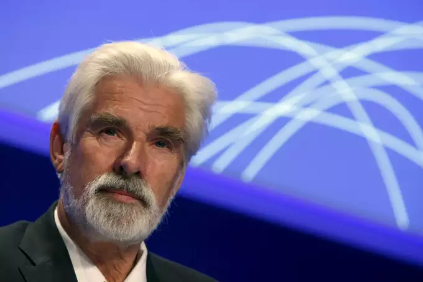By this, he demonstrated that climate models can deliver reliable predictions despite short-term weather fluctuations, proving also the connection of increase in CO2 concentration in the atmosphere and global warming. Klaus Hasselmann completed his doctoral thesis at the Max Planck Institute for Dynamics and Self-Organization (MPIDS) in 1957 before he continued his scientific career at the Max Planck Institute for Meteorology in Hamburg.
The Nobel Prize in Physics 2021 was awarded to the German scientist Klaus Hasselmann, along with Syukuro Manabe (USA) Giorgio Parisi (Italy). Klaus Hasselmann developed a model showing the connection between weather and climate, e.g. relating precipitation to long-term effects such as ocean currents. By this, he demonstrated that climate models can deliver reliable predictions despite short-term weather fluctuations, proving also the connection of increase in CO2 concentration in the atmosphere and global warming. Klaus Hasselmann completed his doctoral thesis at the Max Planck Institute for Dynamics and Self-Organization (MPIDS) in 1957 before he concluded his scientific career at the Max Planck Institute for Meteorology in Hamburg.
Already in 1988, Klaus Hasselmann predicted the change of climate which the world is currently facing: "In 30 to 100 years, depending on how much fossil fuel we consume, we will face a very significant climate change. Climate zones will shift, precipitation will be distributed differently. Then we will no longer be able to talk about random results," the scientist summarized back then. "We should realise that we are entering a situation where there is no turning back." His models are based on linking weather and climate and thus answers the question of why climate models can be reliable despite changeable and chaotic weather. He also developed methods to identify specific signals that both natural phenomena and human activities leave on the climate. With his methods, he was able to prove that the rise in temperature in the atmosphere is due to carbon dioxide emissions by humans.
Physics of complex systems to lay the foundation
Born in Hamburg, Klaus Hasselmann started his scientific career in Göttingen where he did his PhD from 1955 until 1957 at the Max Planck Institute for Flow Research, today MPIDS, under supervision of Walter Tollmien. "We are very proud that one of our former PhD students has received the Nobel Prize in the field of dynamics and self-organization," said Prof. Eberhard Bodenschatz, director at MPIDS. At the same time, the professional path of Klaus Hasselmann is also an excellent example of synergies between different research institutions – as the Max Planck Institutes in Göttingen an Hamburg continue to collaborate on various environmental projects. Ramin Golestanian, managing director of the MPIDS adds: “We congratulate all Nobel laureates on their well-deserved award. It is of tremendous importance to generate models for describing and understanding the interactions of complex physical systems.”
Also, University President Metin Tolan expressed his congratulations. "We are very pleased that Klaus Hasselmann, once again an alumnus of the University of Göttingen, is receiving this outstanding award," he said. "His physical climate models were groundbreaking in the late 1970s.“
Nobel Prize in Physics for the second time in a row
Already last year, a Max Planck scientist was honored with the highest scientific award in physics. Reinhard Genzel, Director at the Max Planck Institute for Extraterrestrial Physics in Garching, received the Nobel Prize in Physics 2020 together with Roger Penrose and Andrea Ghez. The Royal Swedish Academy honored the scientists for their research on black holes.
As in the previous year, the Nobel Prizes are endowed with ten million Swedish kronor (about 980,000 euros) per category. The prestigious Nobel medals and diplomas are traditionally awarded on 10 December, the anniversary of the death of prize donor and dynamite inventor Alfred Nobel.
Contact
MPIDS Presse- und Öffentlichkeitsarbeit
presse@...
Manuel Maidorn
Pressereferent
+49 551 5176 668


